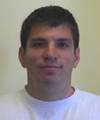Pharmacy grad part of patient care team
by Heather WoolwinePublic Relations
Life for Stephen Brown, Pharm.D., won’t change all that much after graduation. Sure, he’ll be able to work as a pharmacist in the CVS drugstore in Summerville that he’s been employed with since high school.
 Dr. Stephen Brown
Dr. Stephen BrownAnd of course he’ll remain a great asset to the cross country running team at Stratford High School, where he’s spent approximately 400 hours per semester helping students get their run on. He’ll probably continue to help out in the kitchen at Wannamaker County Park, too.
The big change will come with the lack of last minute cramming for tests, the stress of carrying a school and work load simultaneously, and the feeling of longing for that last year to pass him by.
Brown, an avid distance runner, believes in giving back to the community with just about everything he does, whether it’s helping high school students with running or course work in science, math and social studies or becoming a pharmacist to help patients navigate the often confusing and expensive world of medication.
“One thing I like about being a pharmacist is the one-on-one patient interaction that I encounter in my job,” he said. “I don’t mean at all to put other professions down, but when you see a doctor, it’s you walk in, they treat you, and you go. You may not see that person again for months. But I’ll see you every month when you come in and it will give me a chance to notice how you’re doing, ask you about how the medications are working and what’s been going on. The only person that may know your medical situation better might be your family practitioner.”
Brown sees pharmacists as an important interface between patients and the incredible amount of medication in health care today. A student of pharmacy, he made room for knowing new medications, side effects, and interactions each year and kept up with that information on his own. “Medications come off-and-on the market each year and in addition to keeping up with that information, we’re required to also retain knowledge of new and old procedures and diseases.”
Originally Brown wanted to teach high school children but realized that becoming a pharmacist would really give him the opportunity to help people, big and small and at the same time. “If I can give them two to ten minutes of my time and truly make them feel better, that’s wonderful. I want to be able to help them smile when they leave and enter that door,” he said.
Self-described as timely, Brown admits that he plans his days almost to the minute, which accounts for his ability to take on so much responsibility while in school. His classmates and faculty served as a source of strength during some of the more challenging times and he counts the experience in pharmacy school among one of the best in his life.
And while some people might run to get away, Brown used running as a way to bring him closer to his goal. When he briefly went without his favorite exercise, Brown felt things change. “I had some stress fractures in my legs due to some training that I was doing for the Iron Man competition which meant that I couldn’t compete,” he said. “I had to stay off my feet and I got very irritable and uneasy at school. Running calms me down and helps me focus.”
Brown suggests that getting bogged down, whether it be mentally, physically, or emotionally is something that pharmacy students in particular have to avoid if they want to succeed. “If you stop, you’ll end up with way too much over your head,” he said. “You do your best and get through. No one can fly through pharmacy school overall. Something that may be bad in the short run will work itself out in the long run.”
Friday, May 20, 2005
Catalyst Online is published weekly,
updated
as needed and improved from time to time by the MUSC Office of Public
Relations
for the faculty, employees and students of the Medical University of
South
Carolina. Catalyst Online editor, Kim Draughn, can be reached at
792-4107
or by email, catalyst@musc.edu. Editorial copy can be submitted to
Catalyst
Online and to The Catalyst in print by fax, 792-6723, or by email to
petersnd@musc.edu
or catalyst@musc.edu. To place an ad in The Catalyst hardcopy, call
Community
Press at 849-1778.